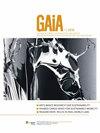悲剧是科学的真正语言吗?为气候变化传播释放戏剧叙事的情感力量
IF 1.9
4区 社会学
Q4 ENVIRONMENTAL SCIENCES
引用次数: 0
摘要
科学家应该将他们的气候变化交流扩展到事实报道之外吗?一个跨学科和参与性的戏剧项目通过引发情绪反应,体现了在气候变化传播中讲故事的力量。当前全球挑战(如气候变化)的复杂性和相互关联性要求新的和创造性的研究交流方式。为了帮助人们理解现象,改善信息获取和保留,建立集体意识和公众参与,情绪往往比事实报道更有影响力。在此背景下,本文以变革性叙事理论为基础,探讨戏剧叙事在释放与气候变化有关的情感方面的功效。作为跨学科和参与性戏剧表演的一部分,结合了艺术,科学和行动主义,对观众进行了简短的问卷调查,以探索性地评估戏剧前后的情绪变化。重要的情感变化突出了参与式戏剧叙事作为传播气候变化的有力工具的潜力,并鼓励在跨学科(戏剧)项目和科学传播工作中进一步探索这种方法。本文章由计算机程序翻译,如有差异,请以英文原文为准。
Is tragedy the true language of science? Unleashing the emotional power of theatrical storytelling for climate change communication
Should scientists extend their climate change communication beyond factual reporting? A transdisciplinary and participatory theatre project exemplifies the power of storytelling in climate change communication by eliciting emotional responses.The complex and interconnected nature of current global challenges such as climate change call for new and creative ways of communicating research. To help people make sense of phenomena, improve information acquisition and retention, build collective awareness and public engagement, emotions are often more impactful than factual reporting. In this context, this paper builds on transformative narrative theory to investigate the efficacy of theatrical storytelling in unleashing emotions in relation to climate change. As part of a transdisciplinary and participatory theatre performance combining the arts, science, and activism, a brief questionnaire was administered to the audience to exploratively assess emotional changes before and after the play. Significant emotional changes highlight the potential of participatory theatrical storytelling as a powerful tool for communicating climate change and encourage further exploration of this approach in transdisciplinary (theatrical) projects and science communication efforts.
求助全文
通过发布文献求助,成功后即可免费获取论文全文。
去求助
来源期刊

Gaia-Ecological Perspectives for Science and Society
ENVIRONMENTAL SCIENCES-
CiteScore
2.30
自引率
18.80%
发文量
43
审稿时长
>12 weeks
期刊介绍:
GAIA is a peer-reviewed inter- and transdisciplinary journal for scientists and other interested parties concerned with the causes and analyses of environmental and sustainability problems and their solutions.
Environmental problems cannot be solved by one academic discipline. The complex natures of these problems require cooperation across disciplinary boundaries. Since 1991, GAIA has offered a well-balanced and practice-oriented forum for transdisciplinary research. GAIA offers first-hand information on state of the art environmental research and on current solutions to environmental problems. Well-known editors, advisors, and authors work to ensure the high quality of the contributions found in GAIA and a unique transdisciplinary dialogue – in a comprehensible style.
 求助内容:
求助内容: 应助结果提醒方式:
应助结果提醒方式:


